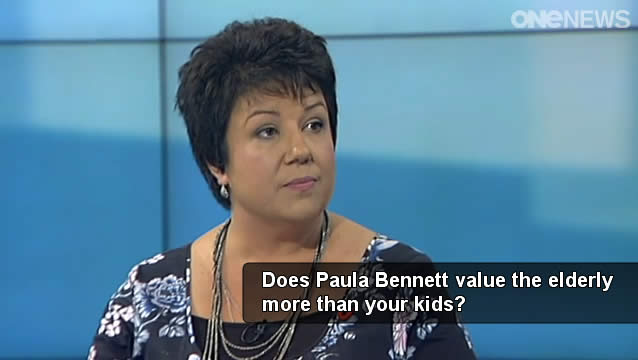Over the weekend on the Q and A TV show Paula Bennett, Minister of Social Welfare, dismissed as invalid any comparison between the income support given to the elderly in New Zealand and the income support given to children. She wasn’t prepared to compare the two policies, both of which provide tax-funded income to people. Her main justification seemed to be that New Zealand Super is inviolate, she simply wasn’t prepared to discuss it or compare anything with it – ‘we have always had it’. She then went on to imply that most parents don’t want income support, ‘they want to get on and be independent … and we should stay out of their lives’.
What a mish-mash of poor information and weak logic. The interviewer was making the valid point that New Zealand Super is widely seen as a successful programme because it is unconditional. He wasn’t suggesting that we should reform New Zealand Super, but that we should copy its excellent model and provide unconditional income support to all kids too.
The Minister said clearly that she values individual choice and independence. Unconditional payments like New Zealand Super provide income support while providing maximum freedom and flexibility to those who receive it. Everybody over age 65 gets New Zealand Super and they can do paid work to supplement it without penalty, and are free to use their time however they choose.
Giving her enthusiasm for freedom and independence, the Minister should, if she were logical, prefer unconditional payments to parents over targeted ones. But in the same breath used to defend freedom and independence, she said she is a committed fan of targeted welfare – with age delineating where that “freedom and independence” applies. The logic is loose, to be kind.
Targeted welfare imposes harsh penalties on parents who work a few extra hours or get slightly higher pay. Benefit levels are reduced to offset the extra earned income. The penalties can be so high that there is no financial benefit from accepting the extra work. Targeted welfare prevents people who are poor being independent. It is the very opposite of what Ms Bennett says she wants. The ‘poverty traps’ implicit in targeted welfare are well known to experts and no doubt government officials – but the Minister is oblivious.
As a point of fact: New Zealand Super was introduced in 1938 but only became the sole means of supporting retirees in the early 1960s. Until then it co-existed with means-tested age pensions. In the early 1960s New Zealand also had universal child payments. Based on origins then, unconditional child payments are every bit as valid and iconic as New Zealand Super.
Due no doubt to the fact that retirees have a vote but children do not, New Zealand Super has persisted since the 1960s, while unconditional child payments have not. It is no accident that the incidence of child poverty outstrips poverty among the elderly by a country mile. We are entitled to have a Minister of Welfare that is willing and able to thoughtfully debate that important reality from a position of knowledge and balance. We were let down at the weekend.

